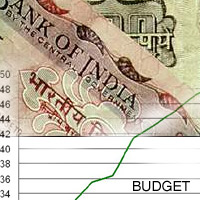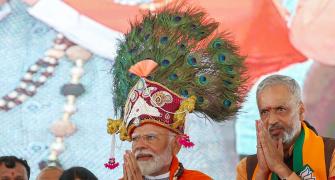 Finance Minister P Chidambaram announced the Union Budget 2013-14 in Parliament on Thursday.
Finance Minister P Chidambaram announced the Union Budget 2013-14 in Parliament on Thursday.
Is it a good Budget, a bad Budget or plain, simple dull. Let's take a look at what India Inc has to say:
Anirudh Dhoot; President – CEAMA & Director, Videocon
The Finance Minister has a given balanced Budget and kept the basic tax structure unchanged except increase of surcharge in some cases.
Focus is given to infrastructure and development of science and technology.
As far as electronics industry is concerned, its encouraging to promote set top box manufacturing by increasing import duty from 5% to 10% and to boost local manufacturing of high tech electronic products in India.
Excise Duty on mobile phone above Rs. 2,000 raised from one to six percentage on the basis of MRP.
So mid and high end mobile phone will get costlier. Further if an MSME grows into a larger enterprise, benefits or preferences will continue up to three years after its growth and this will give incentives to MSME to grow to their potential. Overall, the budget is positive for the Consumer Durables & Electronics Industry.
Rana Mehta, Leader Healthcare, PwC India
Despite the hike in the healthcare allocation the government spend is the lowest amongst BRIC nations.
It may be insufficient to achieve the goals of universal healthcare set out the next five year plan.
A renewed focus on Medical education and creating skill sets in the sector will help reduce the human resource shortage which is currently a roadblock in building the healthcare delivery infrastructure.
Ameera Shah, MD & CEO, Metropolis Healthcare
Although the increase in allocation for healthcare is a positive move, but is certainly not enough.
As I had mentioned earlier, for the sector to make significant strides a minimum allocation of 4 to 5% of GDP is necessary.
Although an increase in spending has been promised, a more sound allocation of resources is crucial for India to enjoy its benefits. Need of accountability on money spent is crucial to effective implementation of healthcare programmes, including the flagship National Health Mission.
Diagnostics ignored yet again: A lot of importance is accorded to treatment, but the basic question is; can one prescribe a drug without diagnosing the disease?
Despite of diagnostics being the first step towards effective treatment, none of our vertical programmes have given adequate importance to it, and the Union Budget also fell short of this.
The diagnostic industry did not get any relief in tax exemptions for life saving reagents on pathology tests.
We need to understand that such taxes get transferred to patients.
This is particularly more important for an Indian healthcare consumer, who is paying for healthcare and particularly diagnostics out of his/her pocket.
A whopping 1.2 billion Indians pay for healthcare out of their pockets. In a limited health insurance environment, these taxes are directly affecting these 1.2 billion Indians.
Direct benefactors for healthcare: 24% increase over the allocation to National Health Mission is certainly a positive note for the sector.
There is a lot of hope from the National Urban Health Mission, and one could contemplate that diseases which were out of focus hitherto would garner more attention.
Chronic diseases and mental illnesses should gather pace with the National Urban Health Mission.
The demographic transition which India is likely to witness in future, allocation for geriatric care is a step towards preparing India to face the burden of healthcare costs from ageing population.
Countries like Japan are already facing such a burden.
This should subsequently be extended so as to effectively control healthcare costs.
Allocation of Rs. 4,727 crore and making six more AIIMS like institutions functional this year should increase the medical capacity, but is too small to affect the Doctor : population ratio significantly.
Nothing has been spoken on ensuring a fair distribution of medical capacity across the country.
Incentivising Doctors and paramedics is the only promising way to ensure an equitable distribution of medical capacity.
Indirect benefactors for healthcare: Apart from direct allocation, healthcare would benefit from other sector allocations.
Prominent among such allocations is the mid-day meal programme and Integrated Child Development Programme.
Since these do not fall under the ambit of healthcare, measuring their impact on reducing child-malnutrition is difficult.
This year’s budget focus on women is a strong enabler towards making them financially independent which improves their access to healthcare services.
Sujay Kalele, Group CEO, Kolte-Patil Developers Ltd
- 1% TDS likely to curb speculation, deliberate undervaluation of property deals
- The Budget does not have any major implications for real estate vertical as such.
- The rate of abatement on homes and flats of above 2000 square feet or costing Rs. 1 crore and above -- reduced from 75% to 70% meaning an increase in service tax outflow, pointing out at luxury housing to get even more expensive
- The TDS of 1% to be charged on the transfer of immovable property looks like an obvious move
- To curb speculation
- Bring about much improved reporting and accountability in high-value immovable property transactions
- TDS to be charged on the gross transaction value rather than net gains, sellers could have a cash-flow impact in situations where the sales are at a loss or at negligible gains.
Dipen Shah, Head of PCG (Private Client Group) Research, Kotak Securities
The Finance Minister has projected fiscal deficit in line with what he had promised and it is far better than what the situation was when he had come in.
To that extent, he has presented a responsible budget. We believe that, the budget focuses rightly on higher investments, which can lead to better growth rates in the future.
Several initiatives have been announced in the infrastructure sector.
Follow up action, in terms of removing infrastructure bottle-necks, will be needed and will go a long way in helping the Government achieve the growth targets.
The imposition of higher excise duty on ITC was anticipated but the extent was larger than anticipated.
However, there are expectations that the company will be able to pass on most of it without any significant impact on volumes.
For the stock market, the reduction in STT for F&O trades is only a marginal positive.
Markets were hoping for some more incentives.
While CTT has been imposed, it has been imposed in a limited way and agricultural commodities have been kept out of the purview.
To that extent, the impact is less severe.
Ravi Kiran, co-founder, VentureNursery
The move to allow investment in Technology Business Incubators to qualify as CSR investment is a good start and good for tech incubators.
Hope it comes with a mechanism to establish accountability of such investments.
The government needs to recognise private accelerators’ role in the entrepreneurial ecosystem as well.
Continuation of non-tax benefits 3 years after the Micro, Small and Medium Enterprises move to next level is welcome, even though the exact impact will need be assessed.
I would also have liked to see reforms in the way we define MSMEs today as it is fundamentally flawed in today's context.
Angel Invested Funds getting pass through benefit needs to make a distinction between pooled angel investment versus individual investment.
Dhiraj Mathur, Leader Education, PwC India on Education
Increased allocations for RTE -- SSA and for RMSA reiterate the government’s commitment towards strengthening school education.
In addition, in a country where nearly 64 per cent of the population will be of working age by 2021, government’s proposal of setting Rs 1000 crore (Rs 10 billion) apart for motivating nearly 10 million youth to voluntarily join skill development programmes and releasing funds from other schemes for skill development activities is a welcome move.
Kuldip Kumar, Executive Director -- Tax & Regulatory Services, PwC India on personal tax
Granting of Rs 2,000 tax rebate to those earning less than 500,000 hardly means anything keeping in view the current inflationary environment.
Those earning more than one crore would also get irked as levy of surcharge of 10 per cent on them is just a counter balancing measure without any specific purpose.
Rahul Garg - Leader Direct Tax , PwC India
Overall an expected balanced approach.
No new material taxes despite challenge of fiscal deficit. Marginal relief to small taxpayers by way of tax rebate upto Rs 2,000.
Presumption against taxpayer in GAAR regulations -- puts enormous burden on taxpayers.
Not addressed the concerns of investors in respect of taxation of indirect transfers and certain retroactive amendments.








